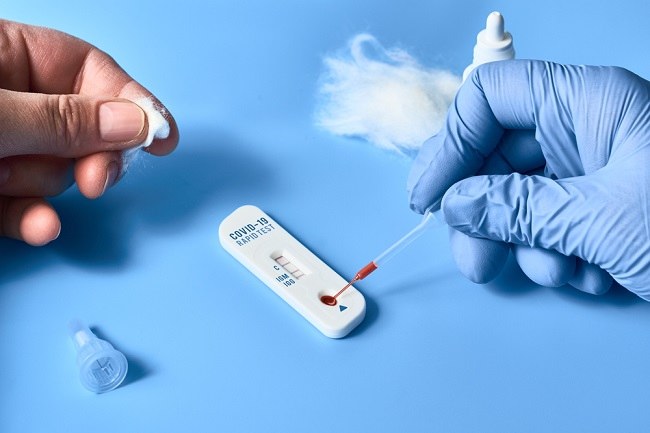Levodopa is a drug used to treat the symptoms of Parkinson's disease, such as shaking, body rigidity, and difficulty moving. Parkinson's disease is a disease that affects how the brain works to coordinate muscle movement. The brain needs dopamine to regulate body movements. Dopamine deficiency is what causes the symptoms of Parkinson's. Levodopa can restore dopamine levels, because levodopa is broken down into dopamine in the human brain. Increased dopamine will increase control over the normal movement of the body.

Trademark: -
About Levodopa
| group | antiparkinsonian drugs |
| Category | Prescription drugs |
| Benefit | Treating Parkinson's disease |
| Consumed by | Mature |
| Pregnancy and breastfeeding category | Category C: Animal studies have shown adverse effects on the fetus, but there are no controlled studies in pregnant women. The drug should only be used if the expected benefit outweighs the risk to the fetus. This drug is thought to affect milk production in nursing mothers but the effect on the baby is not known. If there is no other alternative than levodopa, the condition of the baby who is breastfed should be monitored closely while the mother is taking levodopa. |
| Drug form | Tablets and capsules |
Warning:
- If you are allergic to levodopa or to drugs prescribed with levodopa, such as carbidopa or benserazide, the patient should tell the doctor about this.
- Please be careful when using this drug if you are suffering from diabetes, lung disease, glaucoma, heart or blood vessel disease, hormonal disorders, melanoma skin cancer, psychiatric disorders, kidney disorders, liver disorders, diseases that cause seizures, and stomach ulcers.
- It is recommended not to drive a vehicle or operate heavy equipment, as levodopa can impair the ability to drive.
- Limit consumption of alcoholic beverages during treatment. Levodopa can cause dizziness and lightheadedness and gets worse when taken with alcoholic beverages.
- If an allergic reaction or overdose occurs, see a doctor immediately.
Levodopa Dosage
The following is a breakdown of the dosage for oral levodopa:
- Treating Parkinson's disease
Mature: Initial dose is 125 mg twice daily. After that the dose can be increased every 3-7 days. Maximum dose 8 g per day
- Treating Parkinson's disease when combined with carbidopa
Mature: The initial dose of levodopa is 100 mg taken 3 times a day. Maintenance dose: 750 mg -2 grams of levodopa daily.
- Treating Parkinson's disease when combined with benserazide
Mature: Initial dose 50 mg, 3-4 times a day. Maintenance dose: 400-800 mg per day.
seniors: Initial dose 50 mg, once daily.
Taking Levodopa Correctly
Be sure to read the instructions on the medicine package and follow the doctor's recommendations for taking levodopa. Do not increase or decrease the dose without the doctor's permission.
At the beginning of the treatment period, levodopa is better taken with food, so that the patient avoids indigestion. If the patient's body is used to it, it is recommended to take levodopa on an empty stomach for it to work effectively.
Do not extend or reduce the duration of treatment without the doctor's permission. Make sure that there is sufficient time between one dose and the next.
If you forget to take levodopa, it is advisable to take it as soon as you remember if the next dose schedule is not too close. Do not double the dose of levodopa at the next schedule to make up for the missed dose.
Drug Interaction
Some interactions that can be caused by levodopa if taken together with other drugs are:
- Decreases absorption of levodopa by the body, when taken with tricyclic antidepressants.
- Decreases the effectiveness of levodopa, if taken in combination with antipsychotic drugs.
- Lowers blood pressure, if taken with antihypertensive drugs
- Aggravating the symptoms of Parkinson's disease, if taken with metoclopramide.
- There is an increased risk of arrhythmias when used with anesthetic gases.
Know the Side Effects and Dangers of Levodopa
People react to a drug differently. Sometimes levodopa can make urine, saliva, and sweat a darker color than usual. This medicine sometimes also causes a bitter or burning sensation on the tongue.
Some of the other side effects of levodopa are:
- Dizziness, headache, and giddiness.
- Nausea and vomiting.
- Loss of appetite.
- Hard to sleep.
- Nightmare.
- Tingling in the hands or feet.
Immediately consult a doctor if side effects occur in the form of:
- Faint.
- Visual disturbances.
- Severe stomach ache.
- Black stool.
- Change mood (mood) or mental.
- Easy bruising and bleeding.
- Disorganized behavior.
In addition to paying attention to the side effects of levodopa, patients taking levodopa should also pay attention to the symptoms of a levodopa overdose, including:
- Hypertension.
- Heart rhythm disturbances.
- Insomnia.
- anorexia.
- Hypotension.









